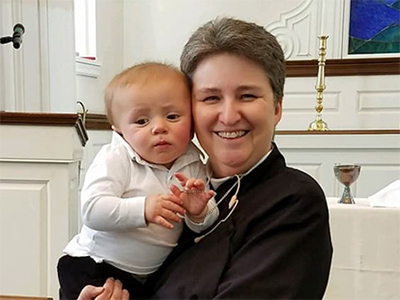Like many second-career pastors, Leslee first felt God’s call when she was in high school. She says, “I knew I was called to serve, but I did not know where that service would occur.” After high school, she attended United Methodist-related Albion College thinking she would either go to seminary or to law school. As a participant in the Gerald Ford Institute for Public Service, Leslee was introduced to opportunities in the public arena and discovered a “..meaningful way to combine my interest in public policy with my call to service.”
Looking back, she has no regrets about the 20 years she spent in that field, believing that public service can be a noble calling that truly impacts the world, touching the lives of those who were hurting, lost or broken. However, she says she was left with “a certain hollowness” which she tried to fill through volunteer work including lay ministry and teaching in her local congregation, Okemos Community Church.

Eventually, that hollowness grew to the point she could no longer ignore it. Her first intention was to serve as a part-time local pastor while still maintaining her career in public service, but she quickly realized God was calling her to ordained ministry. Leslee went to Garrett-Evangelical Theological Seminary, graduated in June and was commissioned as a Provisional Elder at the Michigan Annual Conference this summer. She is now serving as the pastor at First United Methodist Church in Albion.
Garrett-Evangelical Theological Seminary is one of the 13 United Methodist seminaries supported by the Ministerial Education Fund apportionment of the United Methodist Church.
Rev. Fritz makes this move from a career in public service to ordained ministry at a time when the United Methodist Church is in turmoil and the future is uncertain. When asked about her hopes for the church she says, “My hope comes from God, not from human institutions, so as easy as it is to get caught up in the current tensions in our denomination and to let those tensions dominate my thoughts and sap my energy, I know that this church is not the only way God works in the world. If we as flawed humans cannot find a way to use this denominational structure to aide in building God’s kingdom, then God will find a way around our failings.” She takes the long-view. “As important as this issue is, if we cannot find consensus it will not stop God from doing God’s work in the world. All I know is I have been called to this ministry and my hope is that every day God will use whatever gifts I have to serve others so that they might see a glimpse of God.”
We don’t how God will use Leslee and the other second career pastors who, like her, bring their experience and gifts to ordained ministry.
Thanks be to God for the “Second Career.”
excerpt from a story by John e. Harnish, Michigan Conference Communications
One of seven apportioned giving opportunities of The United Methodist Church, the Ministerial Education Fund is at the heart of preparing people for making disciples of Jesus Christ for the transformation of the world. The 13 United Methodist seminaries help students to discover their calling through the challenging curriculum. The fund enables the church to increase financial support for recruiting and educating ordained and diaconal ministers and to equip annual conferences to meet increased demands. Please encourage your leaders and congregations to support the Ministerial Education Fund apportionment at 100 percent.





